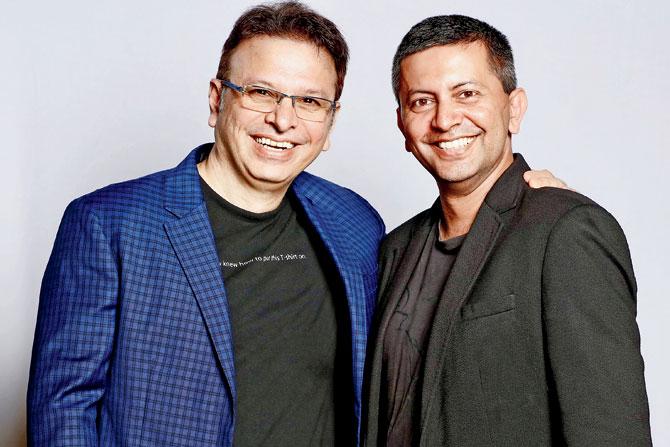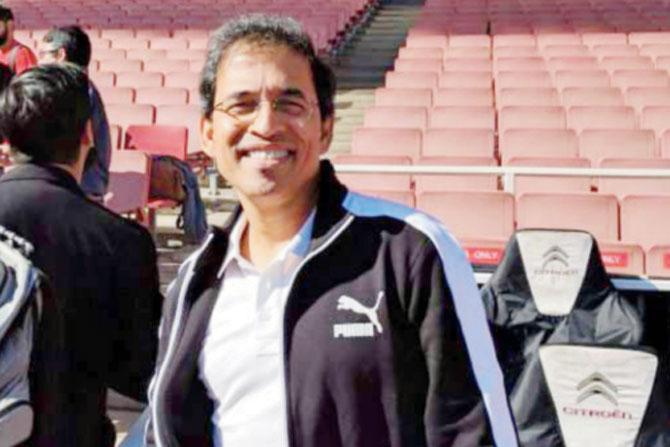Gleaned from their decades of experience as leading public speakers, a new book by Roshan Abbas and Siddharth Banerjee gives the low-down on what it takes to master the art of effective communication

At a banking event he was invited to speak at, Shah Rukh Khan learnt from the MC that the first segment of the evening was to include his interaction with the CEO. The actor asked his assistant to pull out a tome of quotations and quips, which he skimmed through for a while before he took the stage.
ADVERTISEMENT
After sharing an anecdote to establish the trustworthiness of the bank and the man at its helm, Khan switched to his characteristic wit and said he liked the CEO's suit. "But when I asked him for his tailor's number, he said they wouldn't be of much use to me," Khan said. "When I asked why, he said, 'A banker's suit doesn't have pockets. He always has his hands in someone else's!'" And with that, he brought the house down.

Roshan Abbas (left) and Siddharth Banerjee
The incident opens chapter two of the book Speechless (Bloomsbury) by Roshan Abbas and Siddharth Banerjee, which speaks of the importance of homework that even the most charismatic speakers do before a public appearance. The book is the culmination of their decades of experience as leading orators. Abbas's radio, television and stage experience as an actor, host and presenter has won him seven national awards, while Banerjee, who is also Abbas's schoolmate, is an award-winning global marketer and sought-after industry speaker.
"Two years ago, Siddharth and I conducted a workshop on public speaking in Jaipur, which was well-received. That's when he suggested we give structure to what we have learnt over the years in the form of a book," shares Abbas. Banerjee feels there is "a genuine need for people to learn the art of communicating effectively, to prepare for presentations, hold attention, and highlight what they want to through key messages. And we strongly feel that this is a skill that each one of us should develop."

Mini Mathur
Peppered with anecdotes and practical tips, the book takes the reader through the process, from preparation to ending on a high note, in an interesting format. For each chapter under the Logic section, which offers a grounding in communicating effectively - so you are not speechless or fumbling for words - there is a corresponding chapter in the Magic section to take your public speaking skills from good to great - so your listeners are left speechless.
The book also includes detailed interviews with celebrities like Harsha Bhogle, Mandira Bedi, Mini Mathur, Gaurav Kapoor and Cyrus Sahukar, where they share what they have learnt as well-known public speakers. "Public speaking is no longer a domain of emcees or hosts. People are making presentations every day - it's become important even for students. So the book couldn't be better timed," says Mathur, television host, who shares in her interview that she never wings it for an event.

Harsha Bhogle
Here's how the authors envision the process of delivering an effective speech, talk or presentation: Before a cracker of an opening sentence, they write, comes the preparation. And for that they suggest the speaker ought to know who the audience is (to find a common ground and be culturally sensitive); what the objective is; where he is speaking (the occasion and the venue); and when (the part of the day). The next part of the preparation pertains to the actual content, mastery over which is irreplaceable. For fine-tuning the content, the book lays down the principle of write-reduce-repeat.
Along with the right body language, the authors feel that listening to the audience to keep it engaged is important. An aware speaker, for example, knows which of his arguments are landing. They advise the speaker to steer clear of jargon and bombastic words and instead, use simple but evocative language.
An impactful ending is as important as a great beginning, and to do that, the book suggests leaving the audience "with something they value - an exciting idea, a strong challenge, a provocative thought-starter or a way to improve their lives".
"People we look up to have all honed their gift of effective communication," says Abbas, underlining the idea that though it comes naturally to some, mastering public speaking is a continuous process, and anyone can embark on the journey. Banerjee agrees. "Everyone wants at least one standing ovation in life."
Harsha's mantras
* Always have a back-up story ready, if you feel like people are getting bored. In my case, I always keep a Tendulkar or a Dravid story at hand.
* Each slide of my presentation has just a line; anyone else could be the speaker if all your text is on the slide.
* All the good speakers I know of are immensely fluent in the language they choose to communicate in.
* Doesn't matter who you're speaking to, you shouldn't talk down to them. Treat people with respect; the warmth must come through.
Pro-tips to avoid on-stage debacle
* Use numbered cue cards and not sheets of papers, which rustle and distract the audience.
* Be conscious of the use of clichés and filler words when you speak.
* Stay out of the troika of religion, sex and politics, unless the topic demands it.
* Do not end your talk with "Any questions?" Keep it interactive throughout, or deliver an impactful sign-off after the QnA.
* When met with criticism, avoid sarcasm or counter-accusations.
Catch up on all the latest Mumbai news, crime news, current affairs, and also a complete guide on Mumbai from food to things to do and events across the city here. Also download the new mid-day Android and iOS apps to get latest updates
 Subscribe today by clicking the link and stay updated with the latest news!" Click here!
Subscribe today by clicking the link and stay updated with the latest news!" Click here!






